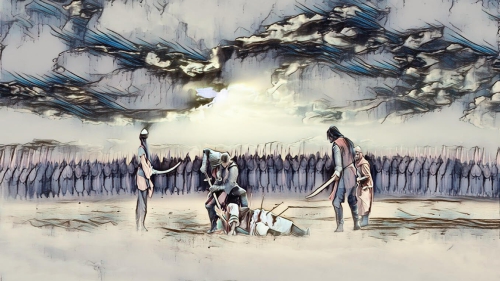The Crow Looking In

There appears to be a growing trend amongst Muslims today where knowledge is used as a proverbial club that beats down anyone who differs with their line of thinking. Discussions regarding Islamic thought that were once considered sacred and adorned with manners (adab) between scholars, are now left to the internet blogs and vlogs, loaded with cursing, name-calling, and street-side fatwas (rulings) condemning entire groups of people to the fire. As a result, we have a generation of young Muslims feeling spiritually abused. Many wonder why they put so much effort into creating a loving relationship with their Creator, only to be oppressed by their supposed brother in Islam. Somehow, the intention behind "enjoining the right and forbidding the wrong" has become some sort of soap box where we beat each other down. It's time we all swallowed our pride and grew up a little.
And by a little, I mean a lot.
In Imam Al-Muhasibi's Risala Al-Mustarshidin (Treatise for The Seekers of Guidance), he says to "protect your heart from having a bad opinion of people by the best possible interpretation." In his explanation of this point, Imam Zaid Shakir says that by "covering up the faults of other Muslims, we are inviting God to cover up our faults." This is derived from Qur'an 24:19 where God warns, "Those who love to broadcast the faults of the believers will have a painful punishment in this world and the next." Now, this is not to say that we shouldn't help our brothers and sisters through difficult situations, especially when we feel that their actions are leading them down a dangerous path. But there is a distinct difference between lifting them up by their bootstraps and pinning our heels down on their wounded necks. They are already shackled to the ground by the rigors of their daily trials. When we choose to harshly lambast others' actions, oftentimes on misinformation or hearsay, it is quite possible that we are projecting our own fears and insecurities onto them. We have to check ourselves and our own intentions, and remember that when we look to others before we look within ourselves, our hearts can be ruined.
If you see someone who is struggling with their iman (faith), don't be so quick to correct them. Don't feel the need to fix them. You may be doing more harm than good.
Interestingly, while looking at patterns of behavior, we see trends within nature quite similar to our own. For example, crows are considered by biologists to be one of the most intelligent animals on the planet.
A group of them is called a murder.
They are called a murder because the group will sometimes kill a dying crow from their flock. As Muslims, we sometimes mimic crows when we blast our friends and family for their faults by focusing entirely on their flaws while forgetting that the person in front of us is someone we care about. We spiritually murder them.
We need some space to breathe spiritually. Most of us are trying to figure out how and why we practice our faith during a time of confused identity. If only we could be the crow that takes a strong look at the murder, actively decides to break away from it, and serve as the tool that helps heal a broken soul.
"O Turner of the hearts, Turn our hearts towards Your Way."
*****
Source: SuhaibWebb.com
Views: 5137
Related Suggestions
knowledge in a way that doesn't make someone feel lower than than
anyone else. Ultimately Allah guides whom he will and leads astray whom
he will and for good reason that isn't our place to guess as to why.

















